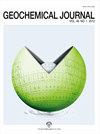日本北部中新世女川组凝灰岩层的锆石U-Pb定年
IF 1.6
4区 地球科学
Q3 GEOCHEMISTRY & GEOPHYSICS
引用次数: 1
摘要
交替节律被解释为反映轨道强迫的气候变化(Tada, 1991),沉积旋回的时间尺度没有得到精确的限制。了解控制Onnagawa组沉积旋回的机制对于理解中新世中晚期全球气候面临显著降温阶段时日本海盆地的演化及其相关环境变化至关重要(例如,Holbourn et al., 2013)。Oga半岛硅藻沉积的硅藻生物地层学发展了女川组的年代地层学(Koizumi et al., 2009)。然而,许多Onnagawa组露头受到石英成岩作用的影响,溶解了大部分由opalA组成的硅藻体,再沉淀为opal-CT(例如,Koizumi et al., 2009;多田和饭岛,1983)。因此,硅藻体的保存变得非常差,硅藻生物地层学几乎不适用。研究区女川组虽然受硅质成岩作用的影响,但其出露程度较好,通过多段拼接可得到其连续层序。日本北部中新世女川组凝灰岩层的锆石U-Pb定年本文章由计算机程序翻译,如有差异,请以英文原文为准。
Zircon U-Pb dating of a tuff layer from the Miocene Onnagawa Formation in Northern Japan
alternation rhythms have been interpreted as reflecting orbital-forced climate changes (Tada, 1991), timescales of the sedimentary cycles have not been precisely constrained. Knowledge of the mechanism controlling the sediment cycles of the Onnagawa Formation is critical to understand the evolution of the Japan Sea basin and its associated changes in the environment during the Middle-to-Late Miocene, when the global climate faced a significant cooling phase (e.g., Holbourn et al., 2013). Chronostratigraphy of the Onnagawa Formation has been developed by diatom biostratigraphy of diatomaceous sediment in the Oga Peninsula (Koizumi et al., 2009). However, many outcrops of the Onnagawa Formation have been suffered from silica diagenesis, which dissolved most diatom frustules composed of opalA and reprecipitated as opal-CT (e.g., Koizumi et al., 2009; Tada and Iijima, 1983). Consequently, preservation of diatom frustules became very poor and diatom biostratigraphy could be barely applicable. Although the Onnagawa Formation in the studied area is suffered from silica diagenesis, it is well exposed, and its continuous sequence can be obtained by splicing several sections. Zircon U-Pb dating of a tuff layer from the Miocene Onnagawa Formation in Northern Japan
求助全文
通过发布文献求助,成功后即可免费获取论文全文。
去求助
来源期刊

Geochemical Journal
地学-地球化学与地球物理
CiteScore
1.70
自引率
12.50%
发文量
11
审稿时长
6 months
期刊介绍:
Geochemical Journal is an international journal devoted to original research papers in geochemistry and cosmochemistry. It is the primary journal of the Geochemical Society of Japan. Areas of research are as follows:
Cosmochemistry; Mineral and Rock Chemistry; Volcanology and Hydrothermal Chemistry; Isotope Geochemistry and Geochronology; Atmospheric Chemistry; Hydro- and Marine Chemistry; Organic Geochemistry; Environmental Chemistry.
 求助内容:
求助内容: 应助结果提醒方式:
应助结果提醒方式:


